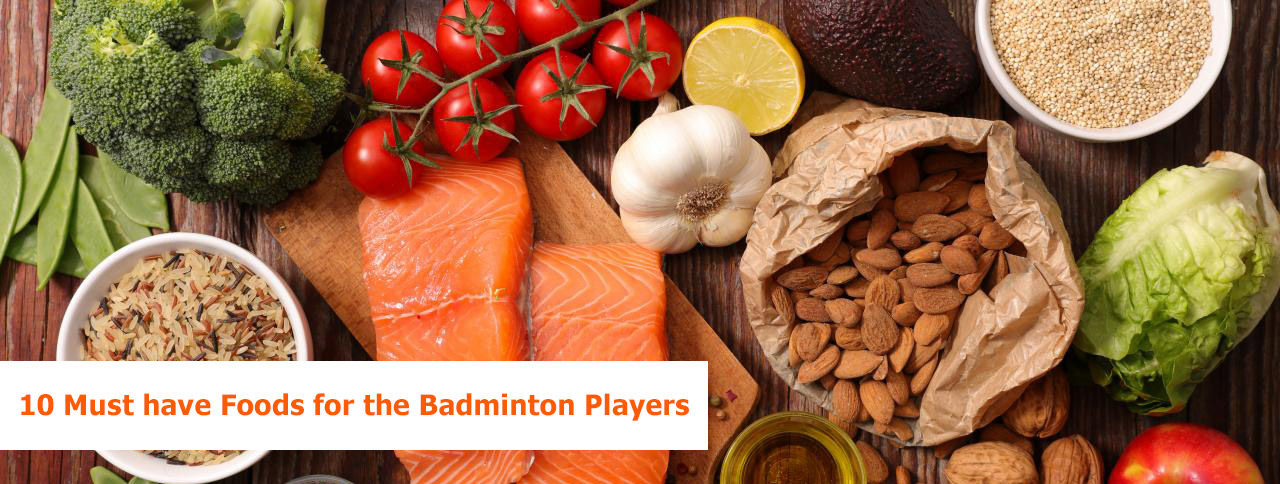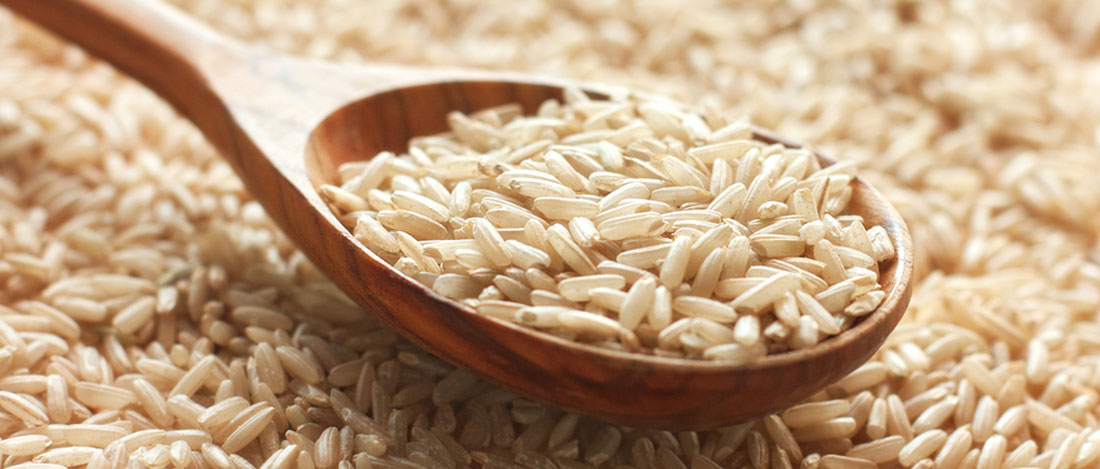
“The Indian cricket team, captain Virat Kohli, drinks water worth Rs 600 per litre”. It is evident to understand the importance of the right type of food for sports players, both professional and amateur.
This significance of food grows even more in sports with high intensity and rapid movements like badminton. Like practicing, choosing the perfect racket, understanding the game forms crucial aspects of badminton, proper nutrition is just as important.
A balanced diet helps a player remain in shape and makes him less prone to injuries. However, sports and injuries go hand-in-hand, which also applies to badminton. Hence, just like there are foods that make badminton players less prone to injuries, there are nourishments that help them recover quickly from injuries.
All in all, certain foods are often referred to as “must-have foods for the badminton players,” which shuttlers cannot miss to have in their diet.
Proper diet for the badminton player is very important. Nutrition for badminton players involves structured meal plans that balance carbohydrates, proteins, and fats to support performance, endurance, and muscle recovery.
Various nutrition experts suggest different types of diets, and all of them work quite well. Plus, those diets are generally divided into different parts, including training, post-training, pre-competition, and recovery. However, some things are prevalent in almost all diets; we are going to talk about some of those things in this piece.
Read on to learn the ten must-have foods for badminton players.
Foods that are essential for nutrition for badminton players1. Bananas
Bananas are a rich source of instant energy. Several reports have proved that just two bananas are enough for a rigorous 90-minute workout session. They consist of fiber and three natural sugars, namely, glucose, sucrose, and fructose, which can offer an immediate burst of energy.
Bananas also contain potassium, which is responsible for proper muscle function, and its deficiency can cause severe muscle cramps. And during exercise, the human body leaks a lot of potassium through sweat.
Hence, bananas are must-have food for badminton players.
2. Broccoli
Broccoli is an unlimited source of energy and vitamins, and it contains the majority of micronutrients, vitamins, and minerals. That's not all; it also contains omega-3 fatty acids with anti-oxidative effects.
Plus, it keeps players sate for a long time.
So, eating broccoli has digestive, anti-inflammatory, and cardiovascular benefits. Hence, it's no surprise that broccoli makes to the diet of every athlete, including badminton players.
3. Dark Chocolate
Dark chocolate is full of calories, and it can give an immense amount of energy to badminton players. Consumption of dark chocolate enhances the blood dilation because of the presence of epicatechin. It increases nitric oxide in the body.
Plus, it dilates the blood, which lowers the oxygen consumption leading to better stamina.
Report shows Dark Chocolate reduce the exercise related muscle injury or muscle damage due to stress.

4. Kidney beans
Our bodies contain gut bacteria, which is essential for digestion and absorption processes. Kidney beans offer raffinose, a trisaccharide sugar moiety of glucose, galactose, and fructose.
All of them serve as food for gut bacteria and yield an enormous amount of energy in the body and a robust immune system, which is highly required by badminton players.
The fibers of Kidney beans take care of players' circulatory system as they lower down the fat molecules present in the blood.
5. Brown Rice
Brown Rice consists of copper, vitamin B3, phosphorus, manganese, magnesium, and selenium. Thus, consuming brown rice enhances heart function metabolism.
Additionally, it improves breathing and stamina. And we all know the importance of stamina for badminton players.
The endless endurance they require to win matches, which makes brown rice another must-have food for badminton players.
6. Garlic
Garlic contains selenium, fiber, calcium, iron, potassium, vitamin B1, B2, and C, manganese, and more. Hence, it's no surprise that garlic has various health benefits. It is scientifically proven to be a blood purifier.
It protects against cold flu and bacterial infection, and it prevents heart problems. So, by making garlic a natural ingredient of their diet, badminton players can avoid getting sick.
7. Milk
There are various types of milk present in the market, so by milk, we mean the dairy milk. Dairy milk is not just a rich source of calcium, but its calcium can easily be absorbed by the human body. Calcium keeps bone and teeth healthier.
Badminton players are susceptible to fractures because they land hard on their feet after playing a forehand smash, which is enough to cause bone fracture. And dairy milk reduces the chances of these fractures.
8. Almonds
Almonds are rich in healthy fats. So eating almonds can result in increased endurance. Players don't get exhausted even during longer games. Furthermore, almonds help keep the heart healthy, which is why they are a must-have food for badminton players.
Alongside their health benefits, almonds may be the most straightforward food to carry around for badminton players. Plus, players can eat them even during the matches.
9. Potato
Potatoes are rich in starch, hence taking the right quantity before a match can do wonders for the energy levels during the game. However, it is mandatory to consume properly cooked potatoes because only they will provide energy. Ingesting french fries and chips will not help in the cause.
10. Eggs
If you are a Non-vegetarian or eggetarian then you can consider eggs otherwise ignore these. Eggs are considered to be the perfect pre-workout and post-workout meal. Since they are the rich source of protein, to be exact, a chicken egg has 6 grams of protein.
They contain all nine essential amino acids: threonine, valine, histidine, leucine, lysine, methionine, phenylalanine, isoleucine, and tryptophan.
Thus, eggs help in recovery after an exhausting practice session.
A badminton player should add things mentioned above to his diet to stay fit and avoid injuries.
However, as previously discussed, injuries are part of the game, and players will get injured no matter what even in the training sessions. So, they should be prepared to face any situation and what's better than to know the diet that will help in a quick recovery. Therefore, we have dedicated the next section to foods that will help in faster recovery.
Carbohydrates for Badminton
Carbohydrates are the primary source of energy for badminton players. They provide the necessary fuel for the body to perform at its best during matches and training sessions. When it comes to carbohydrates for badminton, it’s essential to focus on complex carbohydrates that provide sustained energy.
Whole grains such as brown rice, quinoa, and whole-wheat bread are excellent sources of complex carbohydrates. These foods release energy slowly, helping badminton players maintain high energy levels throughout the game. Legumes such as lentils, chickpeas, and black beans are also rich in complex carbohydrates and provide a good source of protein, making them a valuable addition to a balanced diet for badminton players.
Fruits are another excellent source of carbohydrates for badminton players. Fresh fruits such as bananas, apples, and berries are rich in simple carbohydrates that provide a quick burst of energy. Dried fruits such as dates, apricots, and prunes are also good sources of carbohydrates and can be easily carried during matches for a quick energy boost.
In addition to complex carbohydrates, badminton players should also focus on consuming foods rich in fibre. Fibre helps to slow down the digestion of carbohydrates, providing sustained energy levels throughout the game. Foods rich in fiber include whole grains, legumes, and fruits, making them essential components of a diet plan for badminton players.
Healthy Fats for Badminton
Healthy fats are an essential part of a badminton player’s diet. They provide energy, help to absorb vitamins and minerals and support the health of the heart and brain. When it comes to healthy fats for badminton, it’s essential to focus on unsaturated fats that are found in foods such as nuts, seeds, avocados, and olive oil.
Nuts and seeds are an excellent source of healthy fats for badminton players. Almonds, walnuts, chia seeds, and flaxseeds are all rich in unsaturated fats and provide a good energy source. These can be easily incorporated into snacks or meals, offering convenience and nutritional benefits. Avocados are another excellent source of healthy fats and provide a good source of vitamins and minerals, making them a versatile addition to any diet plan for badminton players.
Olive oil is a healthy fat that is rich in antioxidants and provides a good source of energy. It’s essential to use olive oil in moderation, as it is high in calories. Incorporating olive oil into salads or cooking can enhance the nutritional value of meals. Other healthy fats for badminton players include fatty fish such as salmon and tuna, which are rich in omega-3 fatty acids. These fats support heart health and reduce inflammation, which is crucial for maintaining peak performance.
Pre-Game Nutrition for Badminton
Pre-game nutrition is essential for badminton players to perform at their best. A well-planned meal or snack can provide the necessary energy and nutrients for optimal performance. Regarding pre-game nutrition for badminton, it’s essential to focus on complex carbohydrates, lean protein, and healthy fats.
A balanced meal or snack that includes complex carbohydrates, lean protein, and healthy fats can provide sustained energy levels throughout the game. Pre-game meals or snacks include whole-grain toast with avocado and eggs, Greek yogurt with berries and nuts, or a smoothie bowl with banana, spinach, and almond milk. These combinations ensure players have the energy and nutrients needed to excel on the court.
It’s also essential to stay hydrated before a game by drinking plenty of water or a sports drink. Aim to drink at least 16-20 ounces of fluid 1-2 hours before the game, and 8-10 ounces of fluid 10-15 minutes before the game. Proper hydration helps maintain energy levels and prevent fatigue, making it a critical component of pre-game preparation for badminton players.
Foods that help in faster recovery from injury
The time taken for recovery from injury may be the toughest time for badminton players. Proper nutrition for badminton players is crucial during this period. They often get carried away and don’t pay enough attention to their diets when injured. As a result, they put up a lot of weight because they eat too much sugar or fat. Hence, players should take extra care of their diet while recovering from injury. They should keep unhealthy food to a minimum, reduce their sugar intake, etc. They should eat food rich in protein, zinc-rich food, and more. Muscles are most receptive to carbohydrates and nutrients to rejuvenate muscle-glycogen. Here are some things a badminton player recovering from injury should include in his diet.
Protein Rich Food
An injury usually immobilizes the injured body part, which reduces the muscle mass and strength in that part, but protein can significantly reduce this impact of injuries. Since protein rich-food like eggs, meat, fish, and tofu helps build muscles in the human body. Furthermore, protein can help decrease inflammation and speed up the recovery process.
Plenty of Fiber
Generally, recovery from injury means a limited movement of the injured body part or even the whole body. So, during recovery, players can quickly gain unwanted body fat, and this fat makes the recovery time longer. The best way to reduce the chances of gaining lousy fat is to eat fruits and vegetables with a lot of fiber. Fiber-rich food helps promote the feeling of fullness even with eating less food. When fiber-rich food is combined with protein-rich food, players will need to consume less without feeling hungry.
Calcium-Rich Food and vitamin D
Calcium is responsible for bone strength, nerve signaling, and muscle contractions. Thus, it is essential to keep the amount of calcium intake steady, not just when recovering from injuries. Calcium is available in foods like leafy greens, dairy milk, broccoli, almond, and more. Vitamin D is responsible for the quick absorption of calcium from eating calcium-rich food. Therefore, when calcium and vitamin D are taken together, they play a significant role in recovery from bone injury.
Zinc-rich food
Zinc is an essential constituent of many proteins and enzymes that are instrumental in healing wounds, recovery from tissue damage, etc. As a matter of fact, a deficiency of zinc can delay wound healing. However, eating excessive zinc can cause copper deficiency. So, zinc is vital for wound healing, but eating more than the required quantity won't help that much.
The foods mentioned above will help players recover from any type of injuries they might sustain during badminton. A day at PV Sindhu, life begins with a breakfast of milk and eggs. Lunch includes chicken and green veggies that help pack from the carbohydrates. With rice and vegetables, she takes meat to dinner. For quick bites, use juices, fruits, and nuts. However, eating the right food is insufficient for players to stay in shape or recover from injuries. They also have to avoid particular foods for optimal results, like stuff rich in sugar, as sugar increases body weight rapidly. Besides sugar-rich food, a player should avoid junk food, unhealthy fats, etc. All these things will do more harm to the body than good. Here are a few foods that a badminton player should steer clear of, no matter what.
Hydration and Supplements for Optimal Performance
Hydration is essential for badminton players to perform at their best. Adequate hydration helps to regulate body temperature, transport nutrients and oxygen to cells, and remove waste products. When it comes to hydration for badminton, it’s essential to focus on drinking plenty of water or a sports drink.
A sports drink can provide essential electrolytes such as sodium, potassium, and calcium lost in sweat. Aim to drink a sports drink during long matches or training sessions or in hot and humid environments. This helps maintain electrolyte balance and prevents dehydration, ensuring that players can sustain their performance levels.
In addition to hydration, supplements can also play a role in supporting optimal performance for badminton players. Creatine is a supplement that can help to increase strength and power, while protein powder can help to support muscle recovery and growth. These supplements can be beneficial when included in a well-rounded diet plan for badminton players.
It’s essential to consult with a healthcare professional or registered dietitian before taking any supplements to ensure they are safe and effective. A well-planned diet with various whole foods can provide all the necessary nutrients for optimal performance. By focusing on proper hydration and considering the right supplements, badminton players can enhance their performance and recovery.
Foods to Avoid
A badminton player has to avoid any unhealthy food at any cost. Still, there are some things he/she should not even look at, including:
Food with unhealthy fats
Unhealthy fats are a big no-no for shuttlers. Consuming them can lead to unwanted weight gain, increased risk of diseases, clogged arteries, and more. All of which are the biggest arch-enemies of badminton players. Carrying extra fat on the body means extra fatigue, and badminton players cannot afford that, especially during matches.
And the risk of diseases can put the entire career of a player in jeopardy. Consequently, shuttles should avoid ingesting skin of the chicken, butter, white fat on meat, and fat used for making biscuits and cakes.
According to PV Sindhu - Sweets and junk food are a no-no: there's no room for bad calories, and sugar triggers inflammation, hampering recovery.
Junk Food
Junk food is another thing players should avoid mainly because junk food can cause weight gain. Moreover, the ingredients used to prepare junk food are nowhere near healthy. In fact, they are not even of good quality. The only things junk food will do to a player's body are to make it vulnerable to heart disease and increase body weight and cholesterol levels.
Soda
Soda contains artificial sweeteners, which tricks the human body into thinking it is healthy. In return, the human body starts producing the fat-storage hormone insulin, increasing body weight. So, foods containing artificial sweeteners don't have any health benefits. In contrast, they will make the body prone to health problems and weight gain. Besides the foods mentioned earlier, badminton players should also avoid Alcohol, canned soup, eating a lot of sugar, and a meal without protein.
Badminton is not only about buying the right racket, wearing the perfect shoes, and taking great care of equipment. The ideal blend of eating right, avoiding the wrong food, and practicing hard are just as crucial for a successful badminton career. That said, it is not straightforward to maintain a perfect diet, it requires a different type of control.
However, if you want to be the best in the business, you have to stick to a controlled diet with enough protein, fats, vitamins, minerals, etc.
Your email address cannot be published. Required fields are marked*

 My Account
My Account Track Order
Track Order Sports Guide
Sports Guide